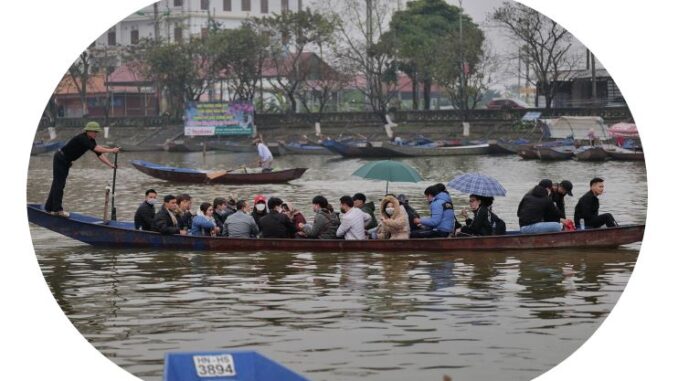
Giong Festival, Dong Da Mound, Co Loa Temple, Perfume Pagoda and Hai Ba Trung Temple are the biggest traditional cultural events in Hanoi in January.
According to the plan of organizing political, cultural and sports events for the period of 2023-2025 of the Hanoi People’s Committee, in the early spring of Quy Mao, the city will hold the Dong Da mound festival on January 26 (the 5th day of the Lunar New Year). ) in Quang Trung ward, Dong Da district.
The festival is more than 200 years old, commemorating the victory of Ngoc Hoi – Dong Da of King Quang Trung – Nguyen Hue and remembering the soldiers who died in the battle. The procession (the procession of the victory god) from the communal house of Khuong Thuong village to Dong Da mound. After the traditional ritual is the game of lion dance, dragon dance, wrestling, human chess, cock fighting.

From January 27 to February 8 (January 6 to 18) is the Co Loa temple festival in Co Loa commune, Dong Anh district. The festival is held in Noi citadel in Co Loa commune, including many relics of temples, communal houses, amnesty, places to worship King An Duong Vuong, My Chau, god Kim Quy, general Cao Lo. The festival is registered as a national intangible culture from 2021, including rituals, games, performances, and food festivals.
Perfume Pagoda Festival from January 28 (January 6 to the end of March of the lunar calendar) in Huong Son commune, My Duc district. The Perfume Pagoda worships the Bodhisattva Quan Am. The Perfume Pagoda Festival imprints the culture and beliefs of the Northern people and the overall religion in Vietnam, including Confucianism, Taoism, and Buddhism.
Giong festival at Soc temple is held from January 27 to 29 (January 6 to 8) at Thuong temple, Soc Son district. The ritual includes the main sacrifice at Thuong temple and the procession of 8 villages, each village has an offering to Soc temple.
Ve Linh village offerings are bamboo flower springs; Phu Ma village carries horses; Duoc Thuong village carries elephants; Duc Hau village is ivory; Yen Sao village is elephant grass; Yen Tang village procession of generals; Xuan Duc village carries the butt ball. Offerings modeled after the legend, prepared weeks in advance.
The army that participated in the battle with Saint Giong was accompanied by a herd of elephants carrying food and a basket of bamboo flowers representing Saint Giong’s bamboo stick after fighting the enemy. The Giong Festival at Soc Temple was recognized by UNESCO as a representative intangible cultural heritage of humanity in November 2010.

Finally, the Hai Ba Trung Temple Festival takes place from January 27 (January 6) in Ha Loi village, Me Linh district. The festival is to remember the preparation for the uprising of two national heroes, Trung Trac and Trung Nhi, in the early AD period. The festival features folk games such as swinging, cockfighting, wrestling, and chess. Hai Ba Trung Temple was recognized as a special national relic in 2013 and the festival was recognized as a national intangible cultural heritage in 2018.
The Hanoi People’s Committee requires the organization of creative, focused cultural events and festivals suitable to actual conditions, bringing spillover effects, actively contributing to the preservation and promotion of values.
Units must attract and promote socialization resources when implementing; comply with regulations on organizing festivals and events, not allowing mistakes, ensuring a civilized, safe, economical and efficient lifestyle.
